动词时态概述 常见8种
英语语法动词八种时态详解

英语八种时态归纳复习时态是英语学习中一个至关重要的内容,广阔初中学生在实际运用时,往往对时态问题倍感棘手,下面我们就归纳复习一下这几种时态。
一、一般现在时〔一〕定义表示经常性或习惯性的动作,或存在的状态,还表示主语具备的性格和能力及客观真理。
例:I get up at 6:30 in the morning .She is at home .(二)构成主要用动词原形表示,当主语是第三人称单数时,在动词词尾加s/es。
(三)句型1、肯定句:主语+谓语+其他。
She reads English everyday .2、否认句:主语+don’t/doesn’t+谓语+其他。
He doesn’t get up at 6:30 in the morning .3、一般疑问句:Do/Does+主语+V原+其他?Do you like English ? Yes ,I do ./No, I don’t .4、特殊疑问句:特殊疑问词+do/does+主语+V原+其他?What time do you get up every morning ?Where does your father work ?〔三〕用法1、表示经常性或习惯性的动作,或存在的状态,带与表示频率的时间状语如:often , sometimes , usually,always , everyday year,month...〕, once/twice a week (month , year , etc.) , seldom , on sundays等连用。
I leave home for school at seven every morning .2、表示客观真理,科学事实、格言警句。
The sun rises in the east .日出东方。
The earth goes around the sun .地球绕着太阳转。
Ten minus two is eight.十减二等于八。
动词八种时态详解
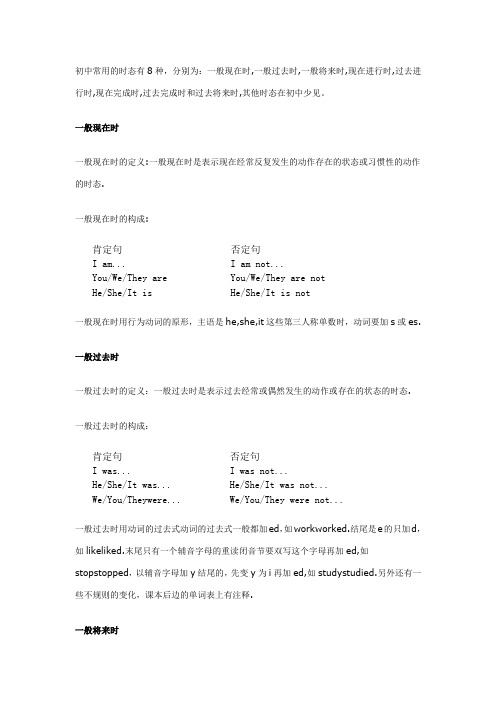
初中常用的时态有8种,分别为:一般现在时,一般过去时,一般将来时,现在进行时,过去进行时,现在完成时,过去完成时和过去将来时,其他时态在初中少见。
一般现在时一般现在时的定义:一般现在时是表示现在经常反复发生的动作存在的状态或习惯性的动作的时态.一般现在时的构成:肯定句否定句I am... I am not...You/We/They are You/We/They are notHe/She/It is He/She/It is not一般现在时用行为动词的原形,主语是he,she,it这些第三人称单数时,动词要加s或es.一般过去时一般过去时的定义:一般过去时是表示过去经常或偶然发生的动作或存在的状态的时态.一般过去时的构成:肯定句否定句I was... I was not...He/She/It was... He/She/It was not...We/You/Theywere... We/You/They were not...一般过去时用动词的过去式动词的过去式一般都加ed,如workworked.结尾是e的只加d,如likeliked.末尾只有一个辅音字母的重读闭音节要双写这个字母再加ed,如stopstopped,以辅音字母加y结尾的,先变y为i再加ed,如studystudied.另外还有一些不规则的变化,课本后边的单词表上有注释.一般将来时一般将来时的定义:一般将来时是表示将来发生的动作或存在的状态的时态.一般将来时的构成:肯定句否定句I/We will go. I/We will not go.You will go. You will not go.He/She/It/They will go. He/She/They will not go.一般将来时由助动词(will,shall)+动词原形构成,shall主要用于以第一人称(I,We)为主语的疑问句中.现在进行时现在进行时的定义:现在进行时是表示在某一时刻或某段时间正在进行的动作的时态.现在进行时的构成:现在进行时由系动词(am,is,are)+现在分词(动词加ing形式)构成.如:肯定句:I am working.疑问句:Am I working?否定句:I am not working.。
英语中常见的八大时态(结构及用法)
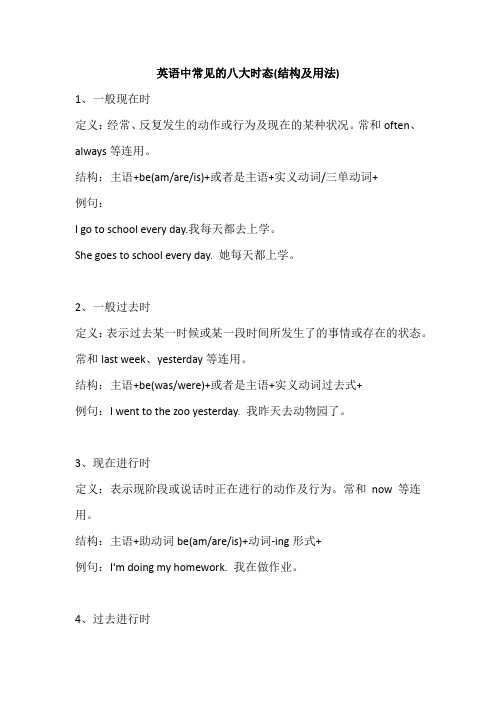
英语中常见的八大时态(结构及用法)1、一般现在时定义:经常、反复发生的动作或行为及现在的某种状况。
常和often、always等连用。
结构:主语+be(am/are/is)+或者是主语+实义动词/三单动词+例句:I go to school every day.我每天都去上学。
She goes to school every day. 她每天都上学。
2、一般过去时定义:表示过去某一时候或某一段时间所发生了的事情或存在的状态。
常和last week、yesterday等连用。
结构:主语+be(was/were)+或者是主语+实义动词过去式+例句:I went to the zoo yesterday. 我昨天去动物园了。
3、现在进行时定义:表示现阶段或说话时正在进行的动作及行为。
常和now等连用。
结构:主语+助动词be(am/are/is)+动词-ing形式+例句:I'm doing my homework. 我在做作业。
4、过去进行时定义:表示在过去某个时间点发生或进行的行为的事情。
常和at this time yesterday等或以when引导的谓语动词连用。
结构:主语+助动词be(was/were)+动词-ing形式+例句:When I got to the top of the mountain, the sun was shining. 我到达山顶时,阳光灿烂。
5、现在完成时定义:表示过去发生的动作对现在造成的影响或结果或过去的动作或状态持续到现在。
构成:主语+助动词(have/has)+动词过去分词+例句:I have lived here for more than twenty years. 我住在这儿二十多年了。
6、过去完成时定义:表示在过去某一时刻或动作以前完成了的动作,也可以说过去的时间关于过去的动作。
构成:主语+助动词(have/has)+动词过去分词+例句:She said she had never been to Paris. 她告诉我她曾去过巴黎。
动词的八种时态的用法
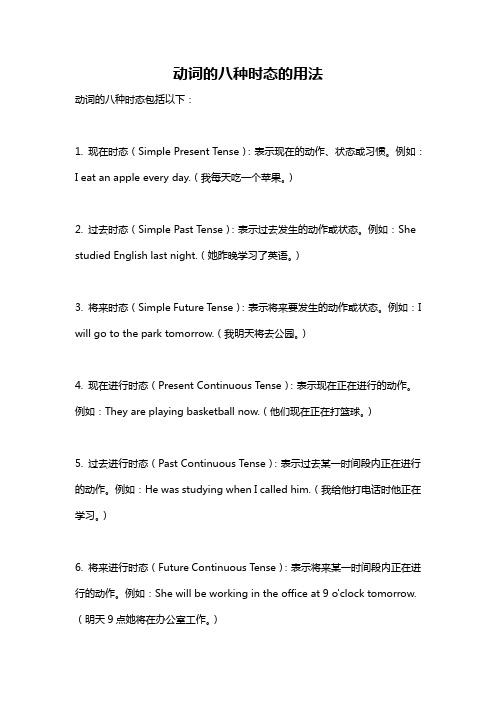
动词的八种时态的用法动词的八种时态包括以下:1. 现在时态(Simple Present Tense):表示现在的动作、状态或习惯。
例如:I eat an apple every day.(我每天吃一个苹果。
)2. 过去时态(Simple Past Tense):表示过去发生的动作或状态。
例如:She studied English last night.(她昨晚学习了英语。
)3. 将来时态(Simple Future Tense):表示将来要发生的动作或状态。
例如:I will go to the park tomorrow.(我明天将去公园。
)4. 现在进行时态(Present Continuous Tense):表示现在正在进行的动作。
例如:They are playing basketball now.(他们现在正在打篮球。
)5. 过去进行时态(Past Continuous Tense):表示过去某一时间段内正在进行的动作。
例如:He was studying when I called him.(我给他打电话时他正在学习。
)6. 将来进行时态(Future Continuous Tense):表示将来某一时间段内正在进行的动作。
例如:She will be working in the office at 9 o'clock tomorrow.(明天9点她将在办公室工作。
)7. 现在完成时态(Present Perfect Tense):表示过去发生的动作与现在的关联。
例如:I have finished my homework.(我已经完成了我的作业。
)8. 过去完成时态(Past Perfect Tense):表示过去某一时间点之前已经发生的动作。
例如:They had already left when I arrived.(当我到达时,他们已经离开了。
)这些时态可以根据需要来表达不同的时间关系和语境。
初中英语时态8种基本时态讲解
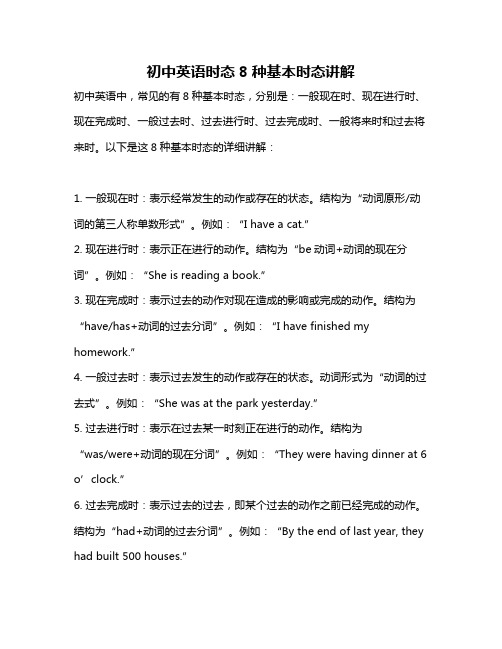
初中英语时态8种基本时态讲解初中英语中,常见的有8种基本时态,分别是:一般现在时、现在进行时、现在完成时、一般过去时、过去进行时、过去完成时、一般将来时和过去将来时。
以下是这8种基本时态的详细讲解:1. 一般现在时:表示经常发生的动作或存在的状态。
结构为“动词原形/动词的第三人称单数形式”。
例如:“I have a cat.”2. 现在进行时:表示正在进行的动作。
结构为“be动词+动词的现在分词”。
例如:“She is reading a book.”3. 现在完成时:表示过去的动作对现在造成的影响或完成的动作。
结构为“have/has+动词的过去分词”。
例如:“I have finished my homework.”4. 一般过去时:表示过去发生的动作或存在的状态。
动词形式为“动词的过去式”。
例如:“She was at the park yesterday.”5. 过去进行时:表示在过去某一时刻正在进行的动作。
结构为“was/were+动词的现在分词”。
例如:“They were having dinner at 6 o’clock.”6. 过去完成时:表示过去的过去,即某个过去的动作之前已经完成的动作。
结构为“had+动词的过去分词”。
例如:“By the end of last year, they had built 500 houses.”7. 一般将来时:表示将来要发生的动作或存在的状态。
结构为“will+动词原形”或“am/is/are going to+动词原形”。
例如:“We will visit the museum next week.”8. 过去将来时:表示从过去的某一时刻看,将来要发生的动作或存在的状态。
结构为“would+动词原形”或“was/were going to+动词原形”。
例如:“He said he would come back soon.”以上就是初中英语8种基本时态的讲解,希望对你有帮助!。
英语八大时态总结
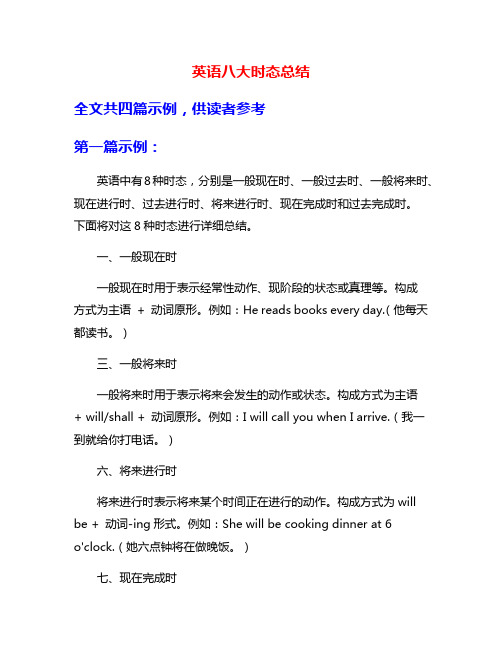
英语八大时态总结全文共四篇示例,供读者参考第一篇示例:英语中有8种时态,分别是一般现在时、一般过去时、一般将来时、现在进行时、过去进行时、将来进行时、现在完成时和过去完成时。
下面将对这8种时态进行详细总结。
一、一般现在时一般现在时用于表示经常性动作、现阶段的状态或真理等。
构成方式为主语+ 动词原形。
例如:He reads books every day.(他每天都读书。
)三、一般将来时一般将来时用于表示将来会发生的动作或状态。
构成方式为主语+ will/shall + 动词原形。
例如:I will call you when I arrive.(我一到就给你打电话。
)六、将来进行时将来进行时表示将来某个时间正在进行的动作。
构成方式为will be + 动词-ing形式。
例如:She will be cooking dinner at 6o'clock.(她六点钟将在做晚饭。
)七、现在完成时现在完成时用于表示过去某个时间开始的动作一直持续到现在,并可能继续发生。
构成方式为主语+ have/has + 过去分词。
例如:He has lived here for 5 years.(他在这里住了5年了。
)总结:1. 一般现在时表示经常性动作、现阶段的状态或真理。
2. 一般过去时表示过去某个时间发生的动作或状态。
3. 一般将来时表示将来会发生的动作或状态。
4. 现在进行时表示现在进行的动作或状态。
5. 过去进行时表示过去某个时间正在进行的动作。
6. 将来进行时表示将来某个时间将会进行的动作。
7. 现在完成时表示过去某个时间开始的动作一直持续到现在。
8. 过去完成时表示过去某个时间之前发生的动作。
掌握这8种时态的用法及构成方式对于学习英语语法和提高英语水平非常重要。
希望以上总结对您有所帮助。
第二篇示例:英语八大时态是学习英语语法非常重要的内容之一,掌握好各种时态的用法可以帮助我们更准确地表达自己的意思。
初中英语知识归纳总结——动词的时态

初中英语知识归纳总结——动词的时态动词的时态(一)教学重点一般现在时在英语中,不同时间里以不同方式发生的动作或存在的状态,要用不同的动词形式来表示,动词的这种不同形式称为动词的时态。
时态从时间上划分,可分为四大类:现在时;过去时;将来时;过去将来时。
从行为上,每一类可以分为四种形式:一般式;进行式;完成式;完成进行式。
这样英语的动词合起来,总共有十六种时态,初中只需掌握其中的八种时态。
1、一般现在时(1)一般现在时表示现在的状态、习惯性的动作或主语所具备的性格和能力等。
①当动词是be时,第一人称用am,第二人称用is,其他人称用are.②当动词是实义动词时,一般用动词原形,但如果主语是第三人称单数时,动词必须用第三人称单数形式,其变化规则如下:助动词do(第三人称单数用does)构成否定句、疑问句及答语,但要注意助动词后原来的谓语动词要恢复原形。
例如:I like music.I don’t like music.Do you like music?Yes, I do No, I don’t(2)一般现在时的用法①表示经常、习惯性动作,常和often, usually, every day, sometimes, always 等时间状语连用。
如:He goes to school by bus every day.They often play football②表示能力、职业、特征。
如:Miss Gao teaches English.Do you speak Japanese?③表示客观存在。
如:The earth moves round the sun.Time and tide wait for no man.④表示已经安排好或计划好的事。
如The plane takes off at 7:30.Classes begin at 8:00⑤在时间状语和条件状语从句中,主句用一般将来时,从句用一般现在时。
初中英语八大时态归纳总结
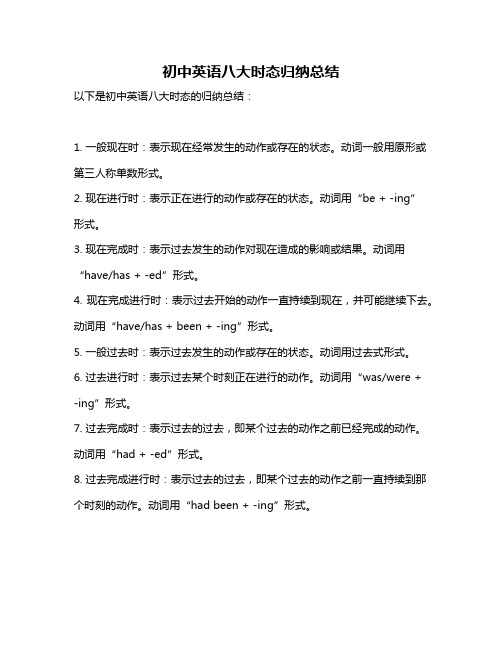
初中英语八大时态归纳总结
以下是初中英语八大时态的归纳总结:
1. 一般现在时:表示现在经常发生的动作或存在的状态。
动词一般用原形或第三人称单数形式。
2. 现在进行时:表示正在进行的动作或存在的状态。
动词用“be + -ing”
形式。
3. 现在完成时:表示过去发生的动作对现在造成的影响或结果。
动词用“have/has + -ed”形式。
4. 现在完成进行时:表示过去开始的动作一直持续到现在,并可能继续下去。
动词用“have/has + been + -ing”形式。
5. 一般过去时:表示过去发生的动作或存在的状态。
动词用过去式形式。
6. 过去进行时:表示过去某个时刻正在进行的动作。
动词用“was/were + -ing”形式。
7. 过去完成时:表示过去的过去,即某个过去的动作之前已经完成的动作。
动词用“had + -ed”形式。
8. 过去完成进行时:表示过去的过去,即某个过去的动作之前一直持续到那个时刻的动作。
动词用“had been + -ing”形式。
以上是初中英语的八大时态,理解和掌握这些时态对于英语学习和交流非常重要。
2024年中考英语复习第十章:动词的时态和语态课件

5. 对现在进行时的特殊疑问句的回答,它不可以用Yes或No直接作答,要根据实际
情况回答。
• -Yes,he is.是的。
-No,he isn't.不是。
现在进行时
现在分词的变化 1. 动词的后面直接加-ing。 • work-working,study-studying, play-playing 2. 以不发音的字母e结尾的动词,先去掉字母e,再加-ing。 • live-living 3. 以重读闭音节结尾并且只有一个辅音字母的动词,先双写这个辅音字母,再加- ing。 • stop-stopping,swim-swimming,run-running, get-getting
现在进行时
现在进行时的句式变化:
1. 肯定句式:主语+be( am, is, are)+现在分词+其它.
• Li Hua is cleaning the classroom.李华在打扫教室
2. 否定句式:主语+be(am, is, are) +not +现在分词+其它.
• Li Hua isn't cleaning the classroom.李华不是在打扫教室,
04
过去进行时
过去进行时
用法
英语中八大时态

英语中八大时态英语中共有八种时态:一般现在时、一般过去时、一般将来时、现在进行时、现在完成时、过去完成时、过去将来时和将来完成时。
一般现在时:一般现在时表示现在持续的动作、状态、习惯和真理,可以用一般现在时表示将来某个动作发生的可能性。
一般现在时用助动词do / does来表示,助动词的位置是句首,动词的形式要变成原形,例如:He usually goes to school at 6 o'clock every day. 他每天通常六点上学。
一般过去时:一般过去时表示过去发生的动作和状态,什么时候发生的都可以用一般过去时表示,一般过去时用助动词did来表示,助动词的位置是句首,动词的形式要变成过去式,例如:I went tothe cinema last night. 我昨晚去电影院了。
一般将来时:一般将来时表示将要发生的动作或状态,用一般将来时表示某一特定时间之后将要发生的动作或状态,一般将来时的主要谓语动词的形式是will/shall + 动词原形,例如:We will go shopping next week. 我们下周去购物。
现在进行时:现在进行时表示正在进行的动作,现在进行时表示现在正在发生的动作,或者将要发生、正准备发生的动作,一般现在时用助动词be (am, is, are)加上动词的现在分词形式来表示,例如:She is playing basketball now. 她现在正在打篮球。
现在完成时:现在完成时表示到过去某一个具体时间截止到现在已经完成的动作或存在的状态,现在完成时的主要谓语动词的形式是have(has)+动词的过去分词形式,例如:She has finished her homework. 她已经完成了家庭作业。
过去完成时:过去完成时表示以过去某个时间为起点,到过去某个特定的时间点应该已经完成的动作或存在的状态,过去完成时的主要谓语动词的形式是had+动词的过去分词形式,例如:I had done my homework before he came. 他来之前我已经完成了家庭作业。
英语的8种时态
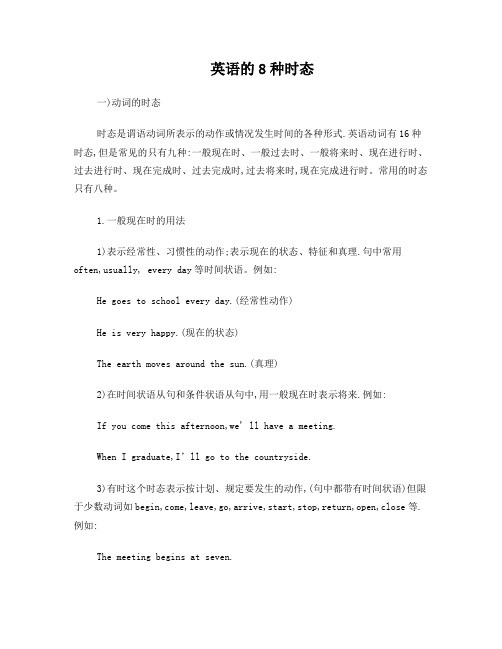
英语的8种时态一)动词的时态时态是谓语动词所表示的动作或情况发生时间的各种形式.英语动词有16种时态,但是常见的只有九种:一般现在时、一般过去时、一般将来时、现在进行时、过去进行时、现在完成时、过去完成时,过去将来时,现在完成进行时。
常用的时态只有八种。
1.一般现在时的用法1)表示经常性、习惯性的动作;表示现在的状态、特征和真理.句中常用often,usually, every day等时间状语。
例如:He goes to school every day.(经常性动作)He is very happy.(现在的状态)The earth moves around the sun.(真理)2)在时间状语从句和条件状语从句中,用一般现在时表示将来.例如:If you come this afternoon,we' ll have a meeting.When I graduate,I’ll go to the countryside.3)有时这个时态表示按计划、规定要发生的动作,(句中都带有时间状语)但限于少数动词如begin,come,leave,go,arrive,start,stop,return,open,close等.例如:The meeting begins at seven.The train starts at nine in the morning.4)表示状态和感觉的动词,如be,like,hate,think,remember,find,sound等常用一般现在时.例如:I like English very much.The story sounds very interesting.5)书报的标题,小说等情节介绍常用一般现在时.2.一般过去时的用法l)表示过去某时间发生的事、存在的状态或过去反复发生的动作.He saw Mr Wang yesterday.He worked in a factory in 19862)表示过去经常发生的动作,也可用“used to”和“would +动词原形”。
英语的八种时态的结构

英语的八种基本时态包括:一般现在时、一般过去时、一般将来时、过去将来时、现在进行时、过去进行时、现在完成时和过去完成时。
以下是这八种时态的基本结构和用法:1.一般现在时:1.结构:主语+ 动词原形/第三人称单数形式(动词+s/es)+ 其他。
2.用法:描述经常发生的动作或状态,表达普遍真理或习惯性行为。
2.一般过去时:1.结构:主语+ 动词过去式+ 其他。
2.用法:描述过去某个时间发生的动作或状态。
3.一般将来时:1.结构:主语+ will/shall + 动词原形+ 其他;主语+ be going to +动词原形+ 其他;主语+ be to + 动词原形+ 其他;主语+ be about to + 动词原形+ 其他;主语+ be due to + 动词原形+ 其他;主语+ be on the point of + 动名词形式+ 其他。
2.用法:描述将来某个时间将要发生的动作或状态。
4.过去将来时:1.结构:主语+ would/should + 动词原形+ 其他。
2.用法:描述过去某个时间将来要发生的动作或状态。
5.现在进行时:1.结构:主语+ be 动词(am/is/are)+ 现在分词(动词+ing)+ 其他。
2.用法:描述正在进行的动作或状态。
6.过去进行时:1.结构:主语+ be 动词的过去式(was/were)+ 现在分词(动词+ing)+ 其他。
2.用法:描述过去某个时间点正在进行的动作或状态。
7.现在完成时:1.结构:主语+ have/has + 过去分词(动词+ed)+ 其他。
2.用法:描述过去发生的动作对现在造成的影响或结果,或者表示从过去某一时间开始一直持续到现在的情况。
8.过去完成时:1.结构:主语+ had + 过去分词(动词+ed)+ 其他。
2.用法:描述过去某个时间点之前已经完成的动作或状态,或者表示一个过去的动作在另一个过去的动作之前发生。
请注意,以上列出的时态结构和用法是基本的概述,实际使用中可能因语境和习惯而有所不同。
初中英语必考八大时态结构及用法详解
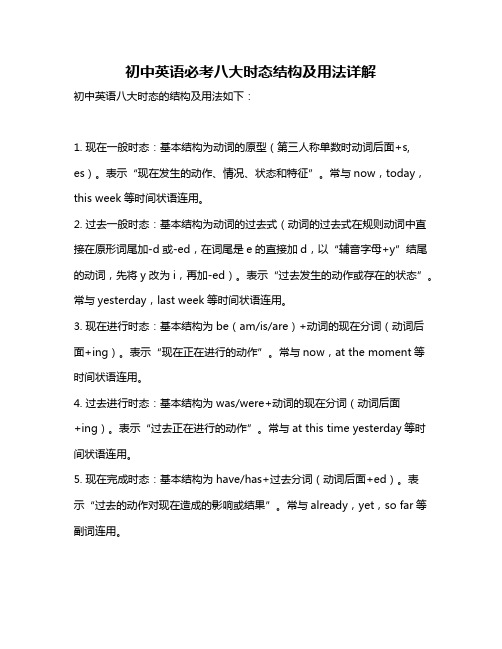
初中英语必考八大时态结构及用法详解初中英语八大时态的结构及用法如下:1. 现在一般时态:基本结构为动词的原型(第三人称单数时动词后面+s, es)。
表示“现在发生的动作、情况、状态和特征”。
常与now,today,this week等时间状语连用。
2. 过去一般时态:基本结构为动词的过去式(动词的过去式在规则动词中直接在原形词尾加-d或-ed,在词尾是e的直接加d,以“辅音字母+y”结尾的动词,先将y改为i,再加-ed)。
表示“过去发生的动作或存在的状态”。
常与yesterday,last week等时间状语连用。
3. 现在进行时态:基本结构为be(am/is/are)+动词的现在分词(动词后面+ing)。
表示“现在正在进行的动作”。
常与now,at the moment等时间状语连用。
4. 过去进行时态:基本结构为was/were+动词的现在分词(动词后面+ing)。
表示“过去正在进行的动作”。
常与at this time yesterday等时间状语连用。
5. 现在完成时态:基本结构为have/has+过去分词(动词后面+ed)。
表示“过去的动作对现在造成的影响或结果”。
常与already,yet,so far等副词连用。
6. 过去完成时态:基本结构为had+过去分词(动词后面+ed)。
表示“过去的动作在过去的某个时间之前已经完成或发生的动作或存在的状态”。
常与by the end of last year,by the time of等时间状语连用。
7. 现在完成进行时态:基本结构为have/has been+动词的现在分词(动词后面+ing)。
表示“动作从过去某时开始,一直延续到现在,或者刚刚完成”。
常与for several days,since等时间状语连用。
8. 过去完成进行时态:基本结构为had been+动词的现在分词(动词后面+ing)。
表示“过去的某个动作从过去某时开始,一直延续到过去的某个时间,或者刚刚完成”。
英语八种动词时态

一般将来时
一般将来时
将来
现在 will be going to 安排好、有计 be to do 划做某事
time
be about to do即将做某事
构成:
①will,shall+动词原形(其中shall只用于第 一人称),表示无计划将要做某事。 ②be going to +动词原形,表示按计划,安 排要发生的事情。 ③be to +动词原形,表示命令 ④ be about to +动原,意为立马发生的事。 ⑤某些动词,可用进行时态表将来,如 come, go, arrive, leave等表示开始或移动意 义的词。
--When will you come to see me, Dad? --I will go to see you when you __the training course. D A. will have finished B. will finish C. are finishing D. finish
10. I will go there when I _____(have, will have, has) time tomorrow. 11. He won’t come to the party unless he _____(be, will be, am, is, are) invited. 12. I’ll wait here until my mother ____(come, comes, will come) back. 13. Please return the book to the library as soon as you ______(finish, finishes, will finish) reading it. 14. Once you _____(see, sees, will see) him, you will never forget him.
常见八种时态标志词
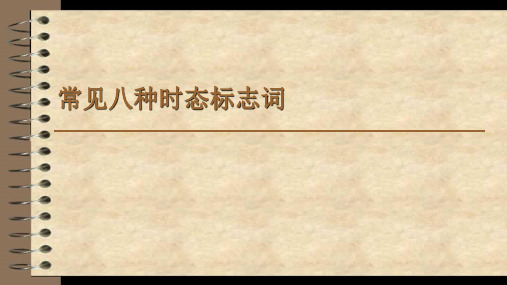
5.一般将来时用will do/be going to do. 标志词:tomorrow,tomorrow. morning,in the future, next week , next Sunday,in+一段时间, soon=right=at once很快,立刻.
6.过去将来时:would do 没有什么标志词,通常用在 从句里。
I didn't know if he would come.
7.现在完成时 has/have done 标志词:already, yet,ever曾经,never从未,just刚刚(与现
在有关的模糊过去时间),before,in the past 5 years, so far ,up to now, two times,for+时间段, since+时间点或从句 8.过去完成时 had done 标志词:by/by the end of+过去时间,by the year 2010....
2.现在进行时am/is /are+doing形式。 标志词:now,at this time, at present,句首有Look!,
Listen!Hurry!等警示语
3.一般过去时用动词的过去式did 标志词有:yesterday, last week , last month, last year, 时间段+ago,two years ago,in 1979,the day before yesterday,just now=a moment ago刚才(与现在无关的明 确过去动词原形do或第三人称单数does形式。
动词时态简单8种

一、一般现在时二、一般过去时三、一般将来时四、过去将来时五、现在进行时六、过去进行时七、现在完成时八、过去完成时时态(Tense)是表示行为、动作和状态在各种时间条件下的动词形式。
因此,当我们说时态结构的时候,指的是相应时态下的动词形式。
一、一般现在时(一)、含义表示经常发生的动作或经常存在的状态,以动词原形表示(单数第三人称用动词的-s 形式)。
否定句和各种疑问句靠特殊疑问词助动词do (does)构成。
动词第三人称单数的变化规则:(二)、用法A) 表示现在发生的动作或状况,或反复、习惯性的动作:表示一直贯穿或反复发生于包括现在在内的整个时间的动作或状态(这是该时态最重要的用法),常用频度时间状语:always,often,seldom,sometimes,usually,never ,hardly,every day(week,...),once(twice,...),a day(week,...)等。
例如:Does he go running three times a week? 他每周跑步三次吗?He always helps others. 他总是帮助别人。
She lives in a large house. 她住在一间大屋里。
She doesn’t know how to say that in English.He leaves for school at 6:30 AM.B)表示客观真理和科学事实:表示没有时间限制的客观真理和科学事实。
例如:What boils at 100℃?----Water does什么在摄氏度100度沸腾?----水The sky is blue.The earth travels round the sun.Paris is the capital of France.C)表示现刻行为:表示具有持续性(或长或短)的现在发生行为(多为状态动词)。
例如:I agree with you completely. Don’t doubt it.我完全同意你的意见。
动词八个时态

动词主要表示动作、状态和性质,而动作和状态的发生有具体的时间和表现方式,这就是英文语中动词的时态。
英语中动词的时态由动词的五种不同形式来表示。
英语动词的五种基本形式为:动词原形、第三人称单数、现在分词、过去分词和过去式。
英语常见八种时态:一般:现在时:谓语动词用原形或第三人称单数过去时:谓语用动词的过去式将来时:谓语用will / be going to + 动词原形现在:进行时:谓语用 am / is /are + 动词的现在分词完成时:谓语用 have / has + 动词的过去分词过去:进行时:谓语用 were / was + 动词的现在分词完成时:谓语用 had + 动词的过去分词将来时:谓语用 would或 was/ were going to + 动词原形特征。
①表示经常性或习惯性的动作或存在的状态。
与一般现在时连用的时间状语:※表示频度的副词always,often,usually,sometimes等。
※on Sundays,on Monday afternoon,every day,in the morning,every year 等时间状语。
※once a year,twice a mouth,three times a week之类的表示频率的词组。
如:He gets up at five o'clock every day. He often plays football.②表示客观真理、事实、人的技能或现在的状态时句子里一般不用时间状语。
如;The earth turns round the sun .(地球绕着太阳转)Light travels faster than sound. (光传播比声音快)③表示十分确定会发生(如安排好的事情)或按照时间表进行的(将要发生的)事情,用一般现在可以表达将来,句子中可以有将来时间。
如:The train for Haikou leaves at 8:00 in the morning(开往汉口的列车上午8点开车)④在时间状语从句中(以when,after,before,while,until,as soon as等引导)和条件状语从句中(以if,unless引导),用一般现在时代替一般将来时,句子可以有将来时间。
英语八大时态表

英语八大时态表英语中的八种时态是一般现在时、一般将来时、过去将来时、一般过去时、现在完成时、过去完成时、过去进行时和现在进行时。
一、一般现在时概念:频繁重复的动作或行为和现在的某种情况。
时间状语:always, usually, often, sometimes, every week (day, year, month…), once a week, on Sundays, etc.基本结构:①be动词;②行为动词否定形式:①am/is/are+not; ②此时态的谓语动词若为行为动词,则在其前加don't,如主语为第三人称单数,则用doesn't,同时还原行为动词。
一般疑问句:①把be动词放于句首;②用助动词do提问,如主语为第三人称单数,则用does,同时,还原行为动词。
二、一般过去时概念:过去某个时间发生的动作或状态;过去习惯性和规律性的行动和行为。
时间状语:ago, yesterday, the day before yesterday,last week(year, night, month…), in 1989, just now, at the age of 5, one day, long long ago, once upon a time, etc.基本结构:①be动词;②行为动词否定形式:①was/were+not;②在行为动词前加didn't,同时还原行为动词。
一般疑问句:①was或were放于句首;②用助动词do的过去式did提问,同时还原行为动词。
三、现在进行时概念:表示现阶段或说话时正在进行的动作和行为。
时间状语:now, at this time, these days, etc.基本结构:am/is/are+doing否定形式:am/is/are+not+doing.一般疑问句:把be动词放于句首。
四、过去进行时概念:表示过去某个时间或时刻正在发生或正在进行的行为或动作。
- 1、下载文档前请自行甄别文档内容的完整性,平台不提供额外的编辑、内容补充、找答案等附加服务。
- 2、"仅部分预览"的文档,不可在线预览部分如存在完整性等问题,可反馈申请退款(可完整预览的文档不适用该条件!)。
- 3、如文档侵犯您的权益,请联系客服反馈,我们会尽快为您处理(人工客服工作时间:9:00-18:30)。
动词时态精简版(常用8种)
一般现在时,一般过去时,一般将来时;
现在进行时,现在完成时;
过去进行时,过去完成时,过去将来时;
一、一般现在时
1.概念:表示现在发生的动作或现在的状态; 表示经常、习惯性的动作或状态。
此时,句子的谓语动词用原形(注:如果主语是第三人称单数,则谓语动词要用“三单”形式)。
2.时间状语如:always, usually, often, sometimes, every week (day, year, month…), once a week(day, year, month…), seldom, never, hardly.
E.g. I am a teacher. She is a singer. You are students.
I sometimes play mobile phone. Li Hua often plays mobile phone.
3.变式练习:
●Li Hua is at home.
否定句:________________________.
一般疑问句:________________________?
●They always come to help us.
否定句:________________________.
一般疑问句:________________________?
●She likes going to the cinema.
否定句:________________________.
一般疑问句:________________________?
二、一般过去时
1.概念:表示过去发生的动作或过去的状态。
此时,句子的谓语动词用其过去式。
2.时间状语如:ago, yesterday, the day before yesterday, last week(year, night, month…), in 1989, just now, at the age of six, long long ago, once upon a time.
E.g. I played mobile phone last night.
3.变式练习:
●Li Hua was at home yesterday.
否定句:________________________.
一般疑问句:________________________?
●They were students of this school.
否定句:________________________.
一般疑问句:________________________?
否定句:________________________.
一般疑问句:________________________?
三、一般将来时
1.概念:表示将来发生的动作或将来的状态。
此时,句子的谓语动词用其am/is/are going to加动词原形或者用will加动词原形。
2.时间状语如:tomorrow, the day after tomorrow, next day(week, month, year…),soon, in a few minutes.
E.g. It is going to rain.
Xiao Dong will leave tonight.
3.变式练习:
●They are going to go to college.
否定句:________________________.
一般疑问句:________________________?
●Li Hua will be there soon.
否定句:________________________.
一般疑问句:________________________?
四、现在进行时
1.概念:表示强调现在正在进行的动作或现阶段一直进行的动作。
此时,句
子的谓语动词用am/is/are 加动词的ing形式。
2.时间状语如:now, at this moment,these days, at present.
E.g. Now, he is doing well in his lessons.
3.变式练习:
●Are you having an English class now?
肯定句:________________________.
否定句:________________________.
●China is getting much stronger and stronger.
否定句:________________________.
一般疑问句:________________________?
五、现在完成时
1.概念:表示强调已经完成的动作,对现在造成了某种影响,有引深意义;表示过去的动作或状态,一直持续到现在。
此时,谓语动词用have/has加动词的过去分词。
2.时间状语如:already,yet,so far,by now,since+时间点/一般过去时的句子,for+时间段,recently, lately, in the past few years.
3.变式练习:
●Has Kevin Durant been the best basketball player?
肯定句:________________________.
否定句:________________________.
●Some mobile games have become so popular in the past two years.
否定句:________________________.
一般疑问句:________________________?
六、过去进行时
1.概念:表示过去某一时刻正在进行的动作或过去某一阶段一直进行的动作。
此时,句子的谓语动词用was/were 加动词的ing形式。
2.时间状语如:at 3:15 yesterday, at that time, at that moment.
E.g. We were discussing the plan all the morning yesterday.
3.变式练习:
●What were you doing at ten o’clock last night?
回答:________________________.
●When he came in, I ____________(read) a newspaper.
七、过去完成时
1.概念:表示以过去某个时间为标准,在此以前发生的动作,即“过去的过去”。
此时,谓语动词用had加动词的过去分词。
2.时间状语如:before + 一般过去时的句子, by the end of last year (term, month…).
E.g. As soon as we got to the station, the train had left.
3.变式练习:
●Before the train left, we _________(get) to the station.
八、过去将来时
1.概念:表示以过去某个时间为标准,在此以后将要发生的动作,即“过去的将来”。
此时,谓语动词用was/were going to加动词原形或者用would加动词原形。
2.时间状语如:the next day (morning, year…),the following month(week…).
E.g. He said he would go to Beijing the next day.
3.变式练习:
●改错:在错误的单词下面划横线,并把正确的答案写在横线下面。
They told me that they are going to leave for Shanghai.。
